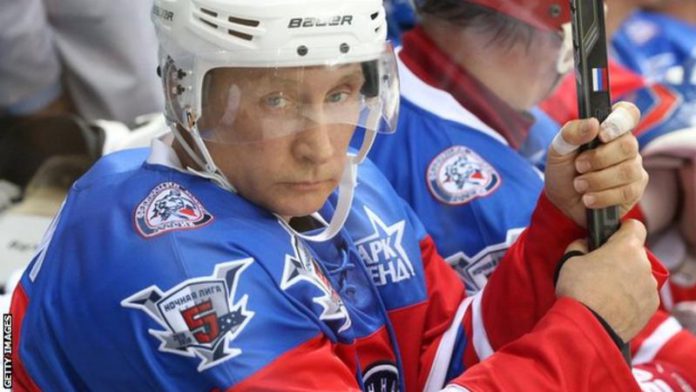Can sporting sanctions have any influence on ending Russia’s invasion of Ukraine? BBC World Service reporter and cricket historian Mo Allie has been looking into what role sporting sanctions can play in politics, particularly how they helped to end apartheid in his homeland South Africa.
Shortly after Russia’s invasion of Ukraine in late February, many of the world’s biggest sporting organisations moved swiftly in an attempt to isolate Russia.
Both European and world football’s governing bodies, Uefa and Fifa, banned Russia and its clubs from taking part in any of their competitions, with many others following suit.
Those in charge of motorsport – including Formula One – athletics, tennis, rugby and many others have excluded Russian athletes, officials and teams.
Last week, the Wimbledon Championships banned the country’s players in a bid to “limit Russia’s global influence through the strongest means possible”.
South Africans know all about the impact such sanctions can have after different sports in the country suffered varying lengths of isolation from the 1960s through to 1991, when the end of apartheid started.
“General sanctions, including sport, worked to bring down the apartheid regime so it makes sense to do it with Russia too,” former South Africa cricket chief Dr Ali Bacher told BBC Sport Africa.
In 1948, laws in South Africa segregated people based on their race and governed all aspects of life to benefit the minority-white rulers in a policy that came to be known as apartheid (Afrikaans for ‘apartness’).
Sanctions – especially in the fields of sport, economics, education, arts and culture – played a decisive role in the eventual demise of apartheid and the installation of a democratic order in South Africa in 1994.
“You can’t take on the world – that’s what they’re doing,” said Dr Bacher.
“Unfortunately, the Russian athletes have to suffer because of their leader, but the same happened to us as South Africans. Many, including myself, didn’t support apartheid but we had to suffer the effects of isolation as well.”
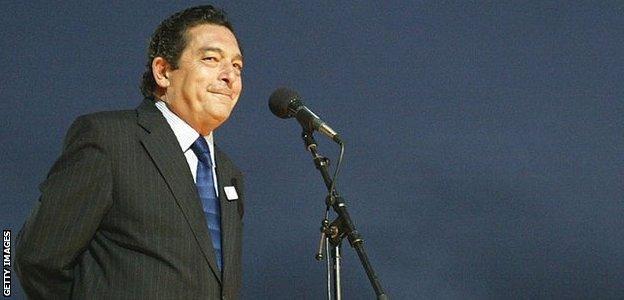
Bacher, 79, played a controversial rule in South African sport, organising rebel tours of the country in the 1980s – by the likes of England, West Indies and Australia – in a bid to maintain a certain level of cricket in his homeland.
Such tours of a pariah nation so isolated by its apartheid policies attracted furious headlines, but Bacher was also taking action to develop cricket in black townships at the same time.
His role in creating a unified cricket board in 1991 – after contacting and building a great friendship with the head of the African National Congress’ sports desk – resulted in South Africa being re-admitted to international cricket over two years before apartheid officially ended.
“It wasn’t only sports sanctions that played a role in bringing down apartheid,” Dr Bacher added.
“Economic and other sanctions also helped but the impact of sports sanctions was very important considering how popular sport is with South Africans.
“We had the best (cricket) team in the world in 1970 and we only returned to world cricket in 1991 so for 21 years world sanctions impacted on South African cricket, no question about it.”
However, they did not stop apartheid swiftly.
- Three decades of sporting isolation
Introduced after the National Party’s election win in 1948, apartheid laws were applied for over a decade before the affiliation of South Africa’s whites-only national sports organisations to international bodies was gradually stopped.
During that period, their unfettered access to international sport – while their black compatriots were denied such opportunities – started grinding to a halt.
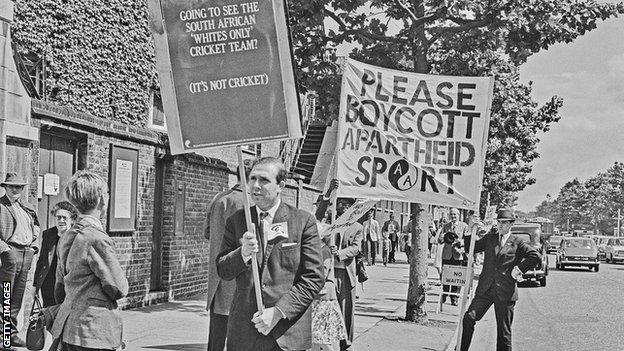
Things began to change in the late 1950s when South Africa’s exclusively-white football association was barred from the first Africa Cup of Nations, prior to being suspended from Fifa in 1961 (and expelled altogether in 1976).
When the white minority government refused to allow an England team that included Basil D’Oliveira – a ‘Cape coloured’ South African who had fled apartheid – to undertake a scheduled tour in 1968, the huge scandal ignited South Africa’s international sporting isolation.
Banned from the 1964 and 1968 Games, the whites-only National Olympic Committee was expelled from the Olympic movement in 1970, by when South Africa had been barred from a host of sports, from athletics to wrestling.
Meanwhile, the visit by Australia in 1969-70 – where the all-whites side captained by Bacher registered a famous 4-0 whitewash – was the last official tour hosted by the South African Cricket Association, which was indefinitely suspended shortly after.
- The ‘soft dimension’
In the late 1980s and early 1990s, there was huge pressure around the world for South Africa to release Nelson Mandela, sentenced to life imprisonment in 1964 after being found guilty of conspiring to overthrow the government.
Anti-apartheid rallies took place across the globe, with a packed concert at London’s Wembley Stadium in honour of the freedom fighter’s 70th birthday amplifying the issue when broadcast to 60 countries around the world.
Given the vested interests of many countries in South Africa at the time, sport became an incredibly useful way of harming many of those either running the country or living as a supposedly-superior race or both.
“The growing international calls for the release of Mandela was a universal movement that helped tremendously to isolate the apartheid regime – sport played a very important role in that,” Professor Andre Odendaal, one of South Africa’s leading sports historians, told BBC Sport Africa.
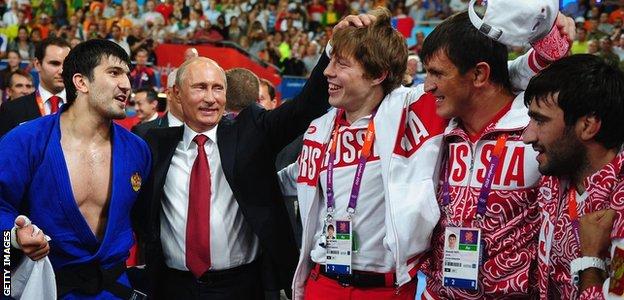
“Western interests were tied up with the economy of South Africa and countries like Britain and USA were supporting the regime against liberation movements in the 1970s and early 80s.
“To call for soft sanctions like sport were more acceptable than the big call for economic sanctions and oil supplies being cut off.
“A key part of the success of the sports boycott was that it was a soft dimension of society that had a massive impact on white South Africans. They’d always felt part of the colonial world – ‘the supremacy of western civilisation in darkest Africa’ as they called it.”
- Sanctions’ suitability?
During his long presidency of Russia, Vladimir Putin has pushed sport, with the country having staged the 2014 Winter Olympics in Sochi and the last football World Cup in 2018, both at vast expense, among a host of events.
The country’s attempts to achieve athletics success through a state-sponsored doping regime also clearly indicated the importance attributed to giving Russians a sense of proud nationalism in their sporting success.
Although the Russian state bans talk of “war” in Ukraine, calling it instead a “special military operation”. it cannot stop questions asked by its citizens as to why sportsmen and women, and events, have effectively been struck off.
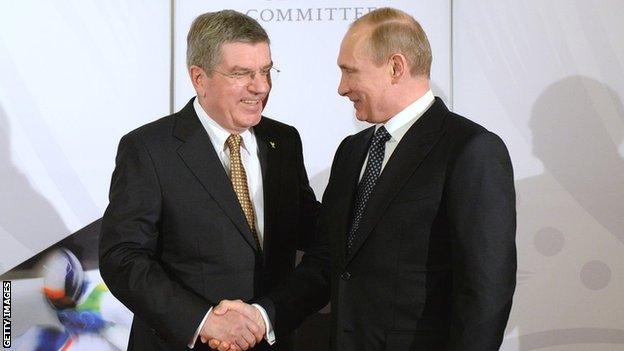
Professor Odendaal, whose work has helped rewrite South African sport’s history to include the role played by the country’s black majority, cautions that sports bodies have to be consistent in their use of sanctions.
“I have sympathy with those trying to use sanctions to help save the situation of the Ukrainian people. Can you imagine the children lying in bomb shelters and basements and living in that terror of the destruction?” he said.
“But if you’re going to use the outbreak of war as a reason to institute sanctions then you must be consistent about it.
“Apartheid was a clear-cut situation of moral responsibility for people in a world where human rights and the right to human dignity for everyone was realised.
“But if you start supporting this or that country depending on which war is happening, then we run the risk of no longer having the Olympic Games.
“There are many conflicts like, for example, Saudi Arabia, an ally of certain people, being in Yemen and conflicts in Afghanistan, Iraq and Syria but there’s no talk of introducing sanctions to help normalise those situations.”

